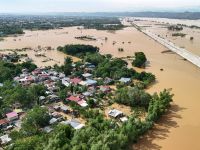U.S. Secretary of States, Colin Powell said Tuesday that the United States is informing several countries, Somalia in particular, that they must deny safe haven to terrorists if they hope to avoid becoming battlefields in the U.S. war against terrorism.
The warnings were made in the framework of major diplomatic efforts aimed at countries that either harbor terrorists or are likely to attract them.
"And one [country] that immediately comes to mind and that has been mentioned particularly is Somalia," Powell said in an interview with The Washington Times. He referred to the East African country as a "lawless place" that has a "past affiliation with such activity." Somalia "is a place we are watching very, very carefully. Not just because it's a weak, broken state — that's not a reason to go there. It's because terrorist activity might find some fertile ground there, and we don't want that to happen."
U.S. and allied military forces were stepping up aerial observations over Somalia. An estimated 100 members of Bin Laden's Al Qaeda network were identified recently in that country, according to intelligence reports. These suspected terrorists belonged to an Islamic group there known as Al-Ittihad Al-Islam (AIAI), U.S. officials said last week. The group, based in Mogadishu is connected to Somali warlord Hussein Mohammed Aideed and has close ties to the Al Qaeda group.
A senior State Department official said Tuesday that U.S. military activity in the region has been complemented by diplomatic initiatives. "We are working with its neighbors and various authorities in Somalia" to prevent terrorist cells from being able to flourish and operate there, according to the official. The diplomatic moves are also aimed at convincing other governments not to let Al Qaeda, or other terrorist groups enter their countries. Powell stated that Washington is helping those that already have terrorist cells on their territories to dismantle them.
However, Somalia is not the only country that the United States has put its anti-terror focus on. The Philippines, Indonesia, Yemen and Sudan are four additional countries where the administration has focused its attention on.
The retired Army General added that "We've got a major problem in the Sudan, but some new opportunities were opened up". "We have started to have discussions with the Sudanese and point out to them, 'What do you get for letting people like this hang out in the Sudan? What does it do for you, except bring down the condemnation of the entire world? It does not put one bowl of rice in front of anyone. And so let's start trying to move in a new direction'".
On Iraq, an additional potential target for the anti-terror campaign, Powell said the administration is "constantly reviewing our plans, our intelligence activities, military options and other options with respect to regime change."
Middle East Conflict
Powell also said that progress in resolving the Middle East conflict is crucial to America's anti-terror efforts and interests.
Israel's seizure last week of the Karine A ship, carrying over 50 tons of weapons was referred to by Powell as a "neat piece of work" and served to "escalate" that conflict. "Beyond that, it is deeply troubling to see the kinds of weapons that were being introduced into this volatile area," he said.
Powell mentioned that "evidence and information" the United States received from Israel indicated the shipment originated in Iran and was going to the Palestinians, though not necessarily Yasser Arafat's Palestinian Authority. "I have no reason to believe that the ship was not heading to the region," he said. "There is a heavy burden on Chairman Arafat and the Palestinian Authority to explain what they know about this and get to the bottom of this, because this is an escalation"
The Bush administration expects to gather more information on last Thursday's incident. An Israeli intelligence team is due to meet with U.S. officials in Washington on Wednesday, Powell mentioned.
U.S. Envoy to the Middle East, General Anthony Zinni just returned to Washington on Monday after a short visit to the Middle East. He was expected to brief Powell on his latest mission. "Then we'll send him back in due course in the very near future," the secretary assured.
"We have to reach a situation where a single car bomber or a single guy shooting a pistol in the air cannot derail this process," he said in reference to Israeli Prime Minister Ariel Sharon's insistence on seven days of complete peace before new negotiations. Powell added that things have quieted down, but still there is a way to go. (Albawaba.com)
© 2002 Al Bawaba (www.albawaba.com)







